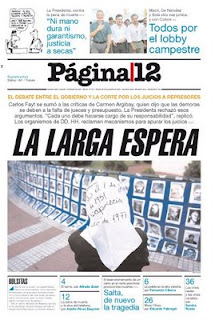Last Sunday, during the opening of Congress, President Kirchner urged judges to speed up the trials of the military perpetrators and to stop delaying tactics.
Judge Carmen Argibay responded that, however much she and her colleagues might wish to process the cases swiftly, they do not have
“lugar ni infraestructura ni jueces ni dinero suficientes para pagar los empleados y la parte informática que se necesita”
"the space or the infrastructure or the judges or enough money to pay our staff or the technological resources which we need" (trans mine)
This has now turned into a bit of a tit-for-tat with ministers blaming the judiciary for stalling the trials and judges blaming the government for not funding them sufficiently. Kirchner has repeated calls for a more efficient justice system. Others have piled in, with Diana Conti, member of the Chamber of Deputies (Camara de Diputados), telling Argibay to "shut up and get on with her work"; I'm not sure exactly what she thought that would achieve. Judges insist that they are doing their best. Kirchner points out that 137 new judges have been appointed in the past year; the judiciary retorts that there are still many posts vacant.
Critica Digital represents this as as issue of the two prominent women involved, each on one side of the scales of justice:

Pagina/12 meanwhile, as befits a newspaper frequently preoccupied with human rights issues, turns to the memory of the victims and displays a Madre de Plaza de Mayo on its front page:
 According to human rights organisations, there are currently around 500 cases regarding atrocities committed in the last dictatorship in the pipeline. Only a little over 30 cases have reached their conclusion since the amnesty laws (the so-called 'full stop' and 'due obedience' laws) were annulled.
According to human rights organisations, there are currently around 500 cases regarding atrocities committed in the last dictatorship in the pipeline. Only a little over 30 cases have reached their conclusion since the amnesty laws (the so-called 'full stop' and 'due obedience' laws) were annulled.I have written before on the problems that ensue when trials are not processed in time. There is a real urgency to get some of these human rights cases moving before everyone involved dies of old age, quite literally. While it's great that some prominent military figures, such as Astiz, are currently in the dock, there are numerous cases of less notorious perpetrators which also deserve a full examination in court. Thirty years of waiting for justice - enough already. As to the question of blame, I really think you can't deliver it to one 'side' alone. The Argentine judiciary is traditionally a deeply conservative body which largely collaborated with the military regime and was not particularly enthusiastic about trying its representatives. Moreover, even in times of democracy, some judges faced threats and even violence when presiding over cases of military perpetrators*. Nevertheless, times change, and thirty years on not all the judges are leftovers from the days of Videla and co. I can well believe that there are decent judges struggling with an overwhelming workload and an inadequate budget. It's a cliche, but true: the two bodies, judicial and legislative, need to work together to solve this issue, not trade insults.
I'll be posting again shortly with some concrete examples of problems in the judicial system.
Dura replica de Christina a Argibay: nego que falten jueces y presupuesto (Critica Digital)
"La Corte tiene que cumplir con su rol" (Pagina/12)
* See for example Patrice McSherry, 'Menem and the Military-Security Forces in Argentina', Latin American Perspectives, 1997, pp. 63-92 [p.77]



No comments:
Post a Comment